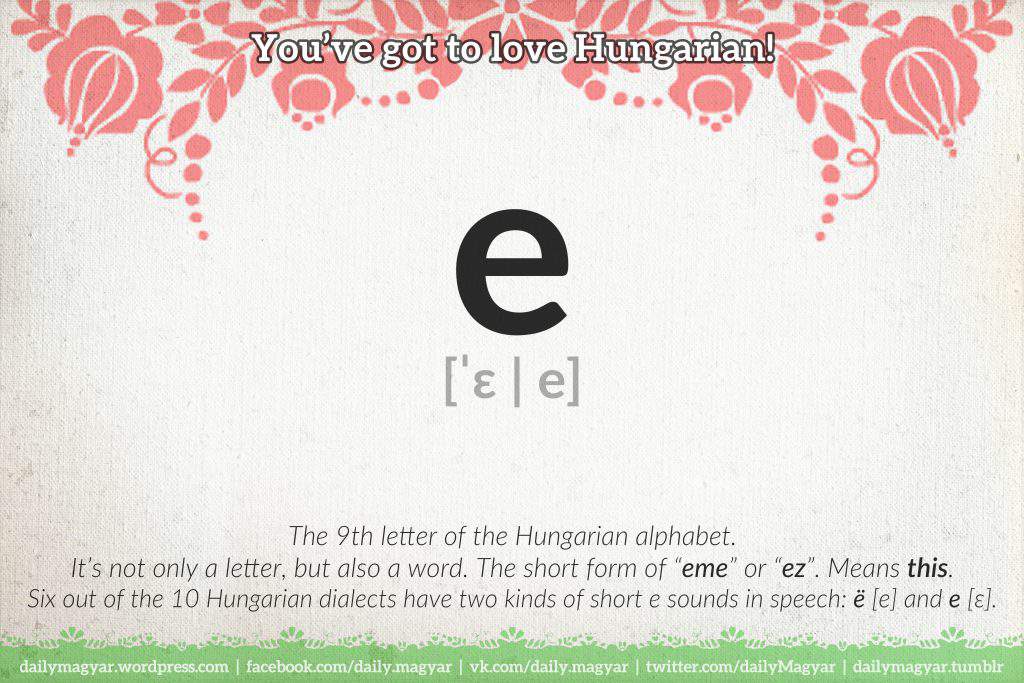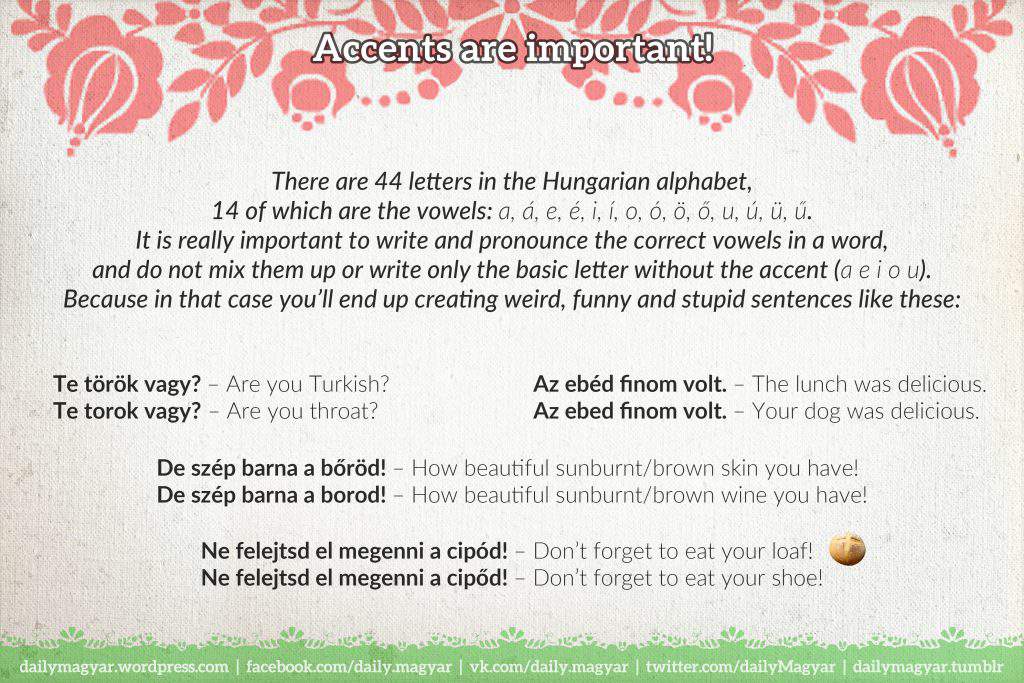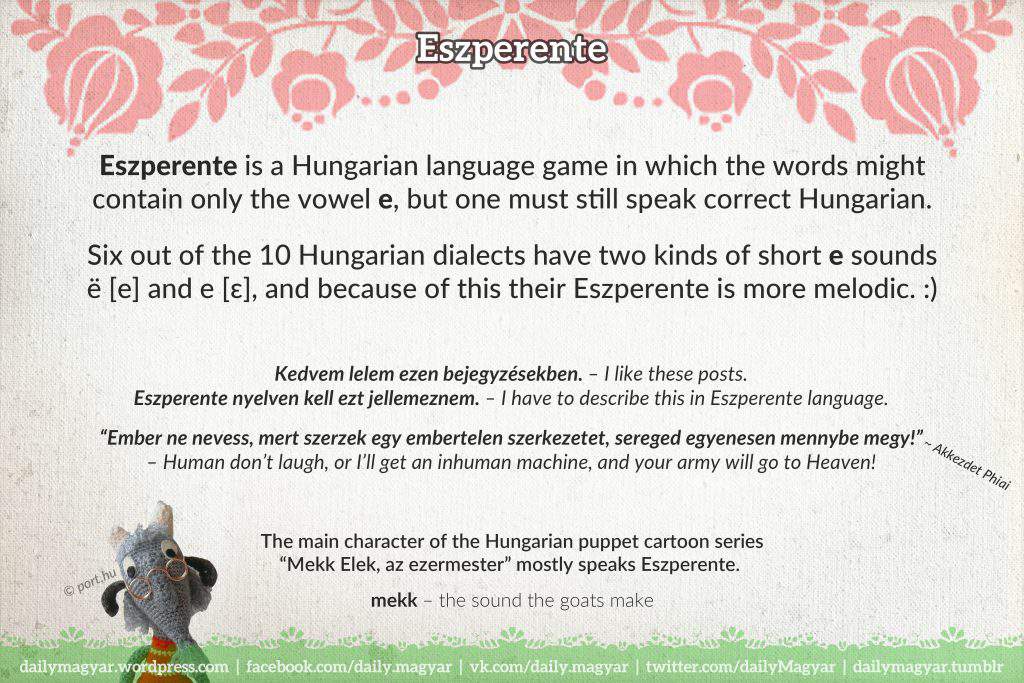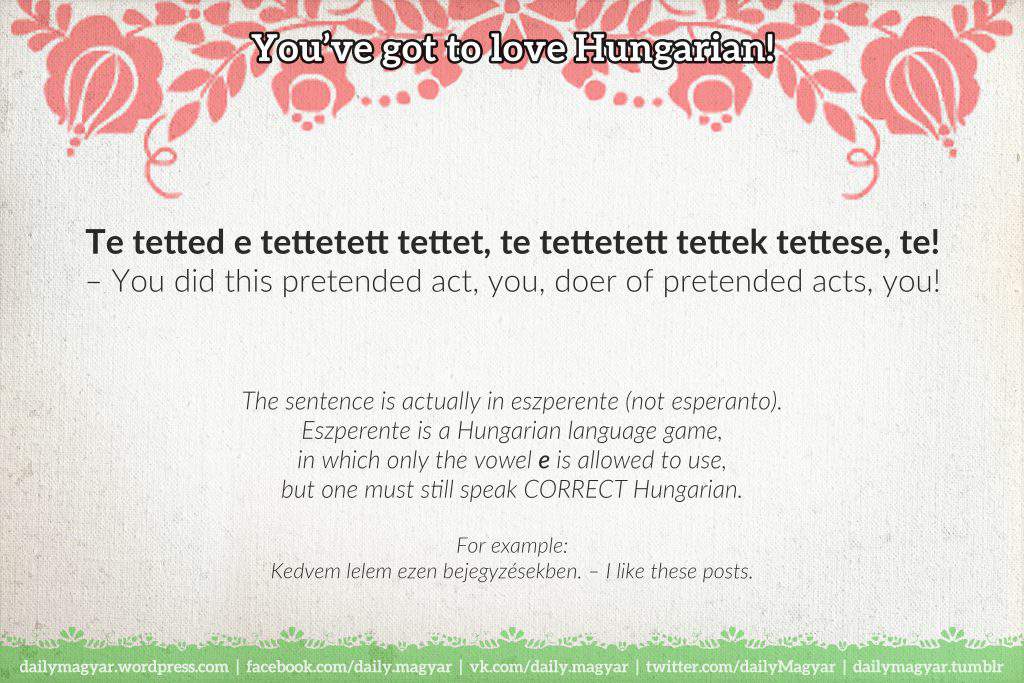Change language:
Mini language lesson #21: Eszperente language

In this episode, we would like to invite you to a little game. The speakers of the Hungarian language have a so-called eszperente language, the gist of which is that you have to express yourself with words that only contain the vowel ‘e’ while being grammatically correct. Yes, it is as tough as it sounds, but why not give it a go? 🙂
Most Hungarians probably remember the eszperente language as a fun game played with friends, schoolmates in breaks. Some teachers even implemented it as part of the grammar lessons. It is an excellent mental challenge which makes you realise how many words contain the letter ‘e’.
There are only a few languages that can create such linguistic bravura.
First and foremost, the Hungarian alphabet is made up of 44 letters, out of which 14 are vowels. The main character of this article is the 9th letter of the alphabet. What makes it special is that it is also a word in itself, meaning ‘this’.

As you might know, we have accents in the Hungarian language, which in this case means that ‘e’ has a partner in crime: ‘é’. Syllables containing letter ‘é’ are usually allowed in the game.

Keep in mind that we are not linguists in any way, we’re just as dazzled by the curiosities of the Hungarian language as foreigners are. So this series doesn’t aim to explain the etymology of words, it’s more of a fun take on our language. We try to bring Hungarian closer to you with witty learning cards made by Daily magyar, a language-enthusiast person, whose posts give an insight into the complexity of Hungarian grammar. But don’t worry, it’s all done in an easy-going way so that it can make learning fun.
It is believed that the roots of the game lie in the famous Hungarian poet Sándor Petőfi’s poem titled The Tisza when he writes (in eszperente): “Which language would dare to compete with you?” (Mely nyelv merne versenyezni véled?) Well, our language is exceptional for sure.

The resemblance between the name eszperente and Esperanto is obvious. It is believed that it was Frigyes Karinthy who named eszperente after the Esperanto language. Many people mix the two, but those stand for very different concepts.
Based on the main rule of the game, some people came up with aszparanta, oszporonto etc., in which you can only use vowel ‘a’, ‘o’ and so on. But these are way less common than eszperente.
Translating the eszperente wordplays to English is hard and aimless since these round sentences only make sense in Hungarian. A fun fact is that there was a cartoon titled Mekk Elek, which was mostly built on the eszperente language, thus proving that it is actually possible to get by with the letter ‘e’ in everyday life.
A possible goal of the game is to describe a certain word in eszperente, like ‘étterem’ (restaurant):
Kellemetes hely, melyben kedvedre ehetsz eleget, ellenben e nevezetes helyen teljes keresetedet elverheted (a pleasant place, where you can eat as much as you want to, but you can also squander all of your salary).
If you look online, several websites collect poems in eszperente. We picked one from poet.hu, so that you can see how cool a poem like this could be.
Vas Zoltán: Szent este
Decembernek nevezetes, kedves esete,
melyet rengeteg mesterember festett le.
Emberek, nem mese ezen rege eredete!
Mert egyszer, ezer meg ezer esztendeje
messze Betlehemben, tehenek mellett
egy szent, teremtett gyermek szendergett.
Jelenedben meg ezeket “festenek”:
Eledellel telt helyeken elesettek
meleg levest s kenyeret eszegetnek.
Beteg gyermekek lelkendezve nevetnek,
melyeket nedves szemek remegve lesnek.
Meleg gesztenye mellett kettesben
lelnek kellemes percekre szeretetben.
Remetelelkek “kemence” melege mellett
csendben elmerengnek s szenderegnek el…
Emelkedett, sejtelmes, remek zene serken fel
s repked fejetek felett, kellemes perceket szerezve
s delejezve, derengve rebben messze,
melyet december lehelete kebelez be…
–
Embertelen, telhetetlen, kegyetlen emberek,
nemesebb lenne fegyverek helyett kezetekbe
csepp gyermekek meleg tenyere lenne lefestve!
Ne felejtsd el, kezedbe, lelkedbe szeretet kell!
Moreover, the famous Hungarian sentence that conquered the world is not only correct grammatically but in eszperente as well:

Lastly, here’s a fun video for you, an actual confession of love in eszperente. You can surprise your partner with this on Valentine’s Day 😉
Source: Daily News Hungary







